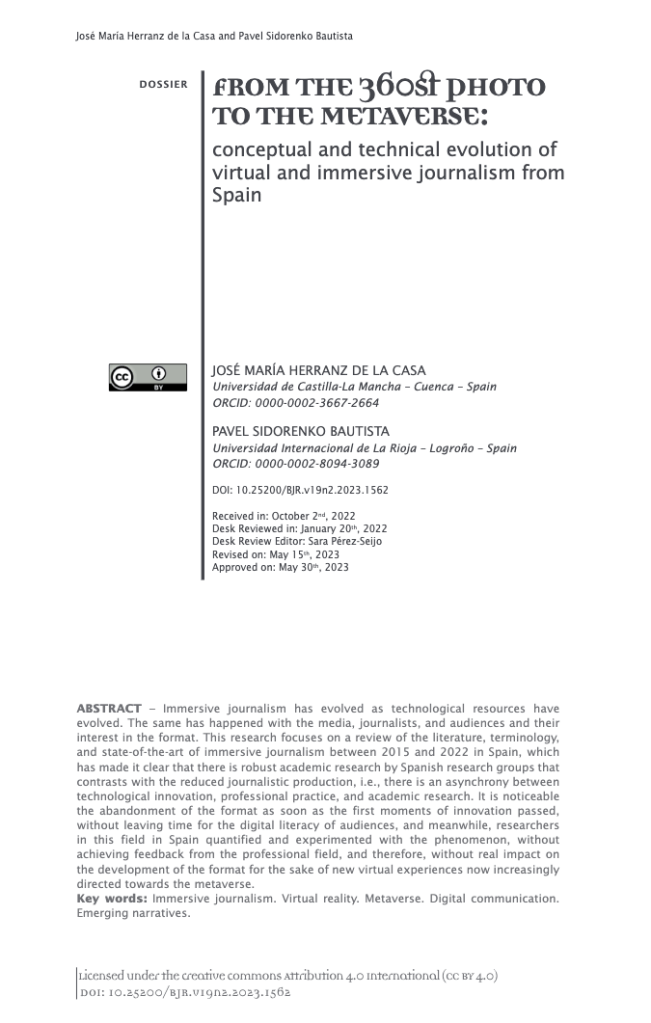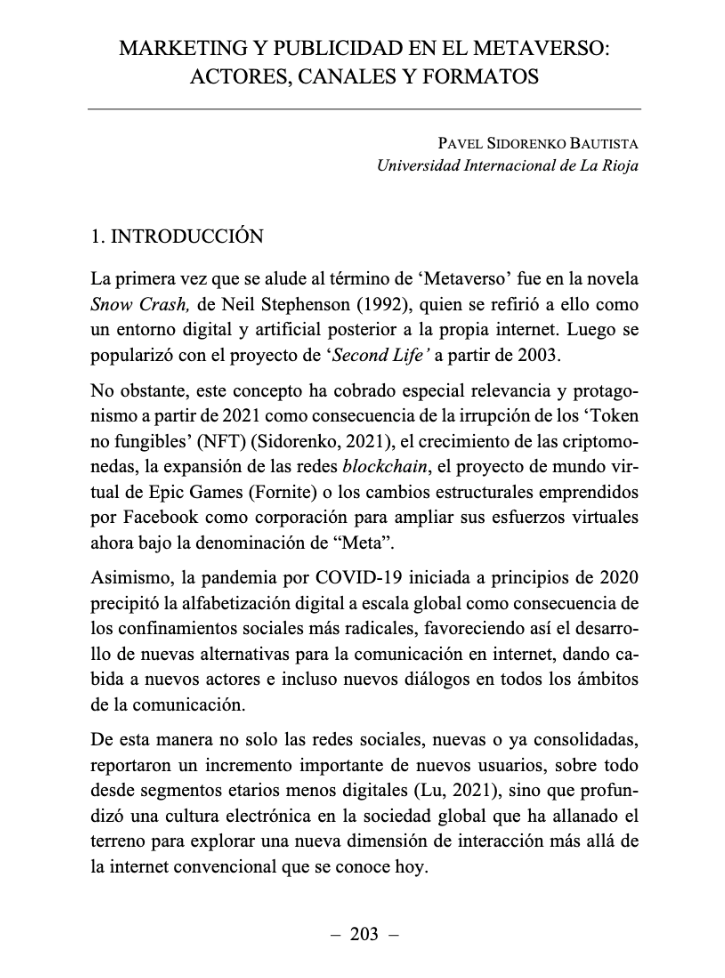
From the 360º photo to the Metaverse: Conceptual and Technical Evolution of Virtual and Immersive Journalism from Spain
Immersive journalism has evolved as technological resources have evolved. The same has happened with the media, journalists, and audiences and their interest in the format. This research focuses on a review of the literature, terminology, and state-of-the-art of immersive journalism between 2015 and 2022 in Spain, which has made it clear that there is robust academic research by Spanish research groups that contrasts with the reduced journalistic production, i.e., there is an asynchrony between technological innovation, professional practice, and academic research. It is noticeable the abandonment of the format as soon as the first moments of innovation passed, without leaving time for the digital literacy of audiences, and meanwhile, researchers in this field in Spain quantified and experimented with the phenomenon, without achieving feedback from the professional field, and therefore, without real impact on the development of the format for the sake of new virtual experiences now increasingly directed towards the metaverse

(Acceso al artículo en español 🇪🇸 https://bjr.sbpjor.org.br/bjr/article/view/1562/1475)
🟠
City Branding and Place Branding in the Metaverse: how real cities build their virtual image and how virtual cities do it
Although the concept of the Metaverse dates back to the end of the 20th century and the first open platforms to the first decade of the 21st century with cases such as Second Life or Roblox, today it has gained much celebrity and transcended the media because of the structural changes of the now-defunct Facebook Corporation (now «Meta»), as well as Epic Games, parents of the popular Fortnite. It is worth mentioning that the remarkable evolution of connections, mobile technologies, and greater digital literacy on a global scale has made this type of initiative more relevant today.
The technological field has expressed its intention to move towards the development of virtual spaces that serve as a social, productive, and recreational extension of individuals, considering three fundamental elements: interactivity, corporeality, and persistence. The initiatives are being very diverse, posing an important range of categories and options from closed environments, directly controlled by companies (as is the case today with the most popular social networks) to other decentralized and more open ones based on the block chain.
Regardless of their quality or category, these metaverses propose, as they have been doing since the first decade of the 21st century, a privileged space for creativity and contact with new user segments, but, above all, for the evolution of dialogues in digital environments. Since the early days of Second Life, it has been possible to see how brands, companies, institutions, and professionals of all kinds have carried out projects in which they have not only transferred real-life experiences but have raised others natively in these virtual scenarios, thus reaffirming an innovative attitude.
Like these actors, cities have expressed their intention to continue pushing and advancing in their public diplomacy processes by entering these platforms through functional replicas, where individuals not only relate to each other but can learn more about these cities, get in touch with them, with their services and heritage offer, in addition to offering activities and services native to the environment. However, there has also been the phenomenon of the construction and development of «cities» or «settlements» of the Metaverse, with very particular aesthetics and synergies, especially in decentralized proposals on block-chain systems such as Decentraland or The Sandbox.
Thus, this research aims to study how the concepts of ‘place branding’ and ‘city branding’ are approached with a focus on the Metaverse and from the Metaverse itself: differences, similarities, particularities, determining elements, and projections. Through a comparative analysis, it will be possible to know how this incipient process is faced from the communication point of view, as well as a possible rethinking of the concept of the city. The results point to few experiences now, where in some cases the goal is to develop digital thematic extensions of strategic areas of real cities, while others are erected natively in this virtual scenario.

🟠
Tecnología, comunicación digital y discursos urbanos: las ciudades del metaverso

🟠
Marketing y Publicidad en el Metaverso: actores, canales y formatos
Aunque el término Metaverso no es nuevo y probado de la ciencia ficción, sí que resulta un terreno virgen y privilegiado para que marcas y empresas exploren y desarrollen un nuevo modelo de comunicación más inmersivo, más interactivo y sobre todo, que procure un alcance hacia nuevos segmentos de público y refuerzan la relación con los más digitales ¿cuáles son los actores más aventajados, qué opciones son las mejores en este momento incipiente?

⬇️
PUBLICACIONES DE CARÁCTER DIVULGATIVO SOBRE EL METAVERSO
Click en las fotos para acceder al contenido


